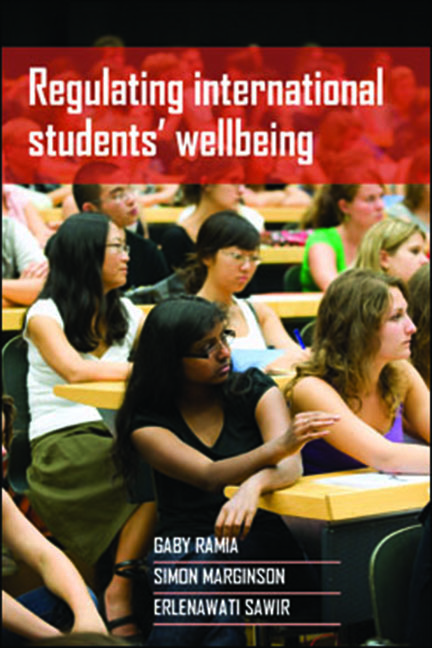Book contents
- Frontmatter
- Contents
- List of figures and tables
- Acknowledgements
- Preface
- one Introduction: global students and their discontents
- two Governing globalisation? National regulation and international student wellbeing
- three Fast growing, diverse: mapping the business of international education
- four ‘There’s gold in them thar students!’ Australia and New Zealand in the global market
- five Much regulation, minimal protection: the Australian model
- six Pastoral care, minimal information: the New Zealand model
- seven Different frameworks, similar outcomes: comparing Australia and New Zealand
- eight Doing it differently: national and global re-regulation and trans-national student citizens
- nine Conclusion
- References
- Index
six - Pastoral care, minimal information: the New Zealand model
Published online by Cambridge University Press: 03 February 2022
- Frontmatter
- Contents
- List of figures and tables
- Acknowledgements
- Preface
- one Introduction: global students and their discontents
- two Governing globalisation? National regulation and international student wellbeing
- three Fast growing, diverse: mapping the business of international education
- four ‘There’s gold in them thar students!’ Australia and New Zealand in the global market
- five Much regulation, minimal protection: the Australian model
- six Pastoral care, minimal information: the New Zealand model
- seven Different frameworks, similar outcomes: comparing Australia and New Zealand
- eight Doing it differently: national and global re-regulation and trans-national student citizens
- nine Conclusion
- References
- Index
Summary
Introduction
Similar to Australia, the New Zealand model of international education regulation has a great many formal provisions when viewed alongside other common law countries. New Zealand is a signatory to GATS. There are similar regulations on migration through international education, although these are currently less strict than their Australian counterparts. There are rules governing the provision of TNHE and quality assurance. Although New Zealand has individual legal provisions, these are also less elaborate than those of Australia in their implementation, due mainly to the unitary rather than federal nature of the New Zealand constitution; hence there is no need for federal– regional liaison in the formulation and implementation of law.
Assessed in terms of how its regime constructs and addresses student welfare, New Zealand stands apart from its neighbour in having a Code of practice for the pastoral care of international students (the Pastoral Care Code or simply, the Code). This has many similarities to Australia's ESOS Framework, but also key differences that form the main focus of this chapter. Further, covered under the same code in New Zealand is the now almost decade-long existence of a student grievance body, compulsorily ruling over welfare-related issues that are not solved to the parties’ satisfaction after a student complaint is lodged – the IEAA, or the Appeal Authority.
The objective of this chapter is to analyse the New Zealand regulation regime, using existing literature and primary data from both enrolled international students and service and policy-level staff informants. The interview data are analogous to those used for Australia, although as described in Chapter One, these are proportionate and appropriate to the smaller size of the population and the nation's education sector, relying accordingly on fewer universities, a smaller number of students and a slightly lower number of staff interviewees. The rationales behind the student and staff data are the same as they are for Australia, namely, to cover student self-perceptions of welfare and related services, staff feedback to supplement student data but also central to uncovering the rationales behind, the gaps in, and the strengths of, the formal national regulation sphere.
- Type
- Chapter
- Information
- Regulating International Students’ Wellbeing , pp. 99 - 118Publisher: Bristol University PressPrint publication year: 2013



